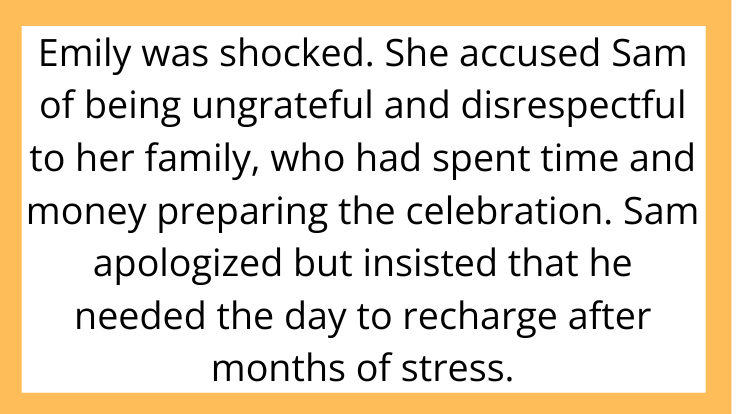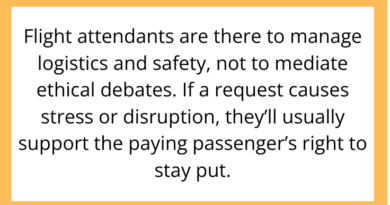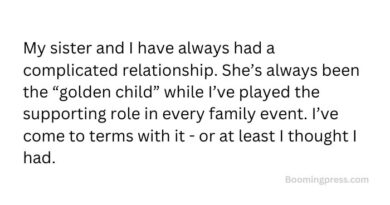AITAH for Wanting to Spend My Birthday Alone Instead of with My Girlfriend’s Family?
When it comes to birthdays, everyone has their own idea of the perfect celebration. Some people love big parties and surprise gatherings, while others prefer a quiet day to themselves. But what happens when your desire for solitude clashes with your partner’s expectations? In today’s AITAH scenario, we explore whether wanting alone time makes you selfish—or simply human.
The Situation: A Birthday with Too Many Expectations

A 28-year-old man—let’s call him Sam—recently posted to r/AITAH about a conflict with his girlfriend, Emily. Sam works a demanding job in IT. His birthday was approaching, and all he wanted was a low-key day: sleeping in, ordering takeout, and playing video games alone.
But Emily had other plans. She organized a surprise dinner at her parents’ house, complete with balloons, cake, and a guest list of 15 family members. When she told Sam the plan a few days in advance, he politely declined and said he would rather spend the day alone.
Emily was shocked. She accused Sam of being ungrateful and disrespectful to her family, who had spent time and money preparing the celebration. Sam apologized but insisted that he needed the day to recharge after months of stress.
Emily left in tears. Now, Sam wonders: AITAH for wanting to be alone on my birthday?
The Case for Sam: Self-Care Over Social Obligation

Many commenters on Reddit saw Sam’s side. Birthdays are personal, and everyone has the right to decide how to spend them. Sam communicated clearly and early that he didn’t want a party. He wasn’t trying to punish Emily or offend her family—he simply needed time to decompress.
One user put it succinctly: “You’re not obligated to perform for other people on your birthday.”
For introverts, a crowded gathering can feel more like work than celebration. Self-care sometimes means saying no, even if it disappoints others.
The Case for Emily: Hurt Feelings and Unmet Expectations

Others empathized with Emily. She thought she was doing something kind and meaningful. Her family had prepared gifts and cooked a special dinner. From her perspective, Sam’s refusal felt like a rejection of her love and effort.
In many relationships, birthdays are an opportunity to connect with loved ones. Emily may have been looking forward to showing Sam how much he means to her, and his decision to spend the day alone could have felt personal.
The Bigger Issue: Communication and Compromise

Different Needs, Different Love Languages
This scenario highlights a common disconnect in relationships: different love languages and expectations. Emily expresses love through gatherings and shared experiences. Sam recharges with solitude and quiet. Neither approach is wrong—but when unspoken assumptions clash, feelings get hurt.
A thoughtful compromise could have been possible:
-
Sam could have agreed to a short dinner before having the rest of the evening to himself.
-
Emily could have planned a smaller, low-key celebration.
-
They could have scheduled the gathering on another day.
Clear, compassionate communication is the only way to bridge these gaps.
Reddit Weighs In

The r/AITAH community was mostly on Sam’s side, though many commenters urged him to be gentle and understanding in explaining his needs.
“You’re not the villain for wanting alone time,” one comment read, “but be sure to acknowledge all the effort your girlfriend put in.”
Others stressed that Emily’s disappointment was valid—but ultimately, no one should be forced into a celebration they don’t want.
Setting Healthy Boundaries Without Guilt

It’s important to remember that boundaries don’t make you selfish. In fact, they often prevent resentment and burnout later on. Birthdays should feel special for the person celebrating, not like an obligation.
When you communicate your needs early and respectfully, you’re not being ungrateful—you’re being honest.
What Can Sam and Emily Learn?

For Sam:
-
Express gratitude for the thought and effort.
-
Offer to celebrate another time in a way that feels comfortable.
-
Reassure Emily that this is about personal needs, not rejection.
For Emily:
-
Recognize that love isn’t always shown through gatherings.
-
Understand that introversion isn’t an attack on your relationship.
-
Be open to celebrating differently in the future.



